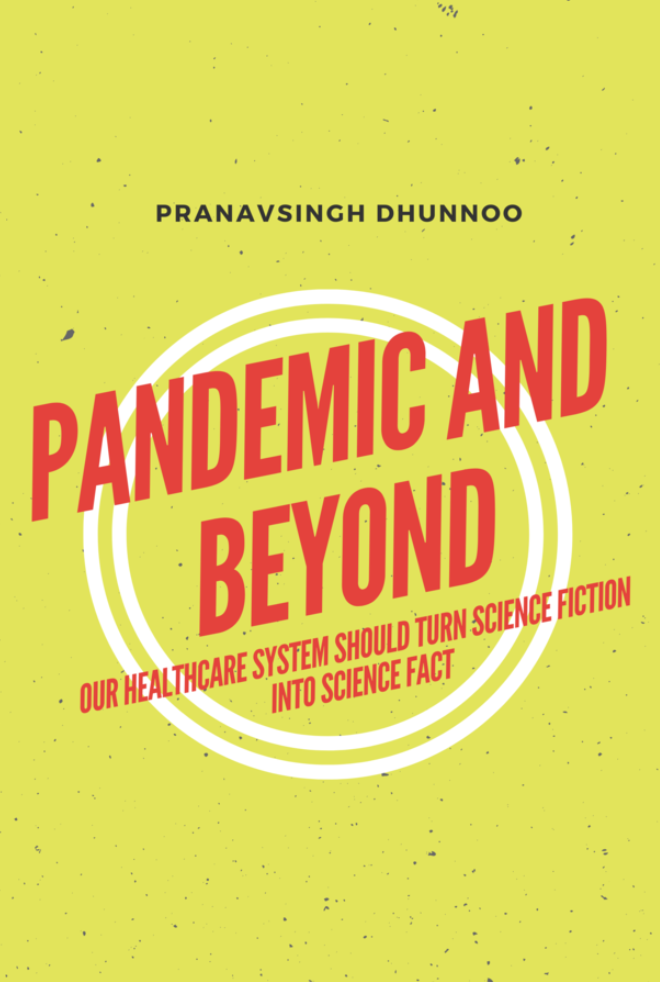For The Future Of Healthcare, We Should Turn Science Fiction Into Science
Text and image by Dr. Pranavsingh Dhunnoo, M.D.
Picture the following scenarios: forecasting a viral outbreak weeks before it happens with the help of an artificial intelligence system; autonomous drones delivering medical supplies; patients donning virtual reality headsets to receive drug-free treatments; and medical students studying anatomy on holograms in their bedroom. These sound pretty much like scenes from an episode of dystopian series Black Mirror or a science fiction blockbuster directed by Ridley Scott, right?
However, as sci-fi as these scenarios might appear, the technologies behind them are very much factual and are currently put in practice; just not at a large enough scale. Let’s contemplate how each of the quasi-sci-fi examples above is already science fact.
Before the WHO or the CDC issued warnings regarding COVID-19, it was an artificial intelligence (A.I.) company, BlueDot (1) that did so. Its algorithm went through loads of data on news reports, airline data, and animal disease outbreaks reports, to detect any noteworthy trends. Epidemiologists subsequently further analyzed those trends to confirm their findings and sent out warnings to BlueDot’s customers.
Medical drone company Zipline deployed its autonomous, long-range delivery drones to deliver personal protective equipment (PPE) (2) in the U.S. in the current pandemic. Meanwhile in continental Africa, Zipline’s drone delivery services are the norm in Ghana (3) and Rwanda (4) which is a game-changer for providing medical supplies to remote areas, as such modes of delivery forego the need for hour-long road trips to under 14 minutes (5) by air.
With a virtual reality (VR) headset, a patient can be immersed into a calming scene that can serve as a distraction for pain relief, completely drug-free. The method has been successfully used for OCD therapy (6), phobia treatment (7) pain relief for surgical patients (8) and even for women undergoing labor and delivery (9)
Medical students at Case Western University in the U.S. have been using the Microsoft HoloLens MR headset for several years (10) already. During the COVID-19 pandemic, first-year medical students at the institution were equipped with the device (11) for remote anatomy practices. A survey conducted among those students found that more than 80% (12) considered their fully-remote anatomy lessons to be comparable or better than in-person sessions.
While these advanced technologies and the scenarios they enable might sound futuristic or even far-fetched to many, they are part of the emerging field of medicine known as digital health. They bring about a disruptive force to the medical landscape that democratizes access to healthcare and can drastically improve the medical landscape as we know it to give a glimpse of a more equitable healthcare of the future.
“While these advanced technologies and the scenarios they enable might sound futuristic or even far-fetched to many, they are part of the emerging field of medicine known as digital health.”
But more than revolving only around technology, part-and-parcel to digital health is a strong social and cultural component. In fact, the literature defines digital health (13) as “the cultural transformation of how disruptive technologies that provide digital and objective data accessible to both caregivers and patients leads to an equal level doctor-patient relationship with shared decision-making and the democratization of care”.
Simply put, even with all the latest technologies at hand, if physicians and patients do not understand them and do not responsibly put them to practice, the digital overhaul of the healthcare system will not be an effective one. An effective overhaul will require a concerted effort from every stakeholder across the healthcare landscape from physician through regulators to patients to adopt new roles and collaborate at an equal level; hence the need for a cultural transformation. In an idealistic view, patients will consult with their physicians about, say a personal health sensor (like a portable ECG monitor or smart peakflow), and the latter can guide their patients regarding which technologies is appropriate for them and advise them to discuss results over a telemedicine consultation before heading to the emergency department for any abnormal reading in lieu of overwhelming the medical staff. Meanwhile, the adoption of such tools will be made secure by regulatory bodies overseeing the secured and ethical handling of sensitive patient data.
In this way, we can see that digital health represents a new dimension to healthcare as we know it; and it is far from an ephemeral phenomenon. Several countries like Denmark (14), Kazakhstan (15), Australia (16) and Rwanda (17) are putting forward national digital health strategies or efforts in the same line in place to better attend to the digital health overhaul at a national level. This overhaul will not happen overnight and will be a gradual process; but the earlier countries devise strategies around the concept, the more prepared they will be to face eventual challenges down the road. Moreover, early adopters stand to become leaders in the new digital health field as it slowly but surely takes over healthcare.
“Digital health represents a new dimension to healthcare as we know it; and it is far from an ephemeral phenomenon.”
Norway is itself well-poised to become such a leader in digital health given how the country is showing signs of effective digital health adoption. The Norwegian centre for E-health research noted how pre-pandemic, 1,400 out of of the country’s 5,000 GPs offered digital medical services but following the public health crisis, that number shot to 4,800 (18) Patients in Norway as well are favouring digitised access to care, with Accenture’s 2019 survey finding more than 74% of respondents (19) factor in a provider's digital capabilities to choose a provider; as opposed to only 50% in 2016.
“Norway is itself well-poised to become such a leader in digital health given how the country is showing signs of effective digital health adoption.”
Nevertheless, given its novelty and the paradigm shift that it represents, we need to constantly generate discussions around digital health so as to prepare ourselves for the eventual changes it brings along. It is with this aim that I recently published a book titled Pandemic And Beyond: Our Healthcare System Should Turn Science Fiction Into Science Fact. With sci-fi-esque scenarios, input from industry leaders and my own insights being professionally involved in the field, the book analyzes digital health solutions that were ready made tools to address challenges highlighted by the COVID-19 pandemic and contemplates how they are well-suited to overhaul the healthcare landscape well beyond the crisis.
I would recommend you, whether you are a doctor, medical student or patient, to consider getting a digital copy for only $5 on Leanpub (http://leanpub.com/pandemic_and_beyond) (20) and would very much welcome your feedback so that we can keep the discussion going around the sci-fi-esque future of healthcare. It is only through inquisitive minds like yours that we will be able to turn science fiction into science fact and help democratise access to care and efficiently bring about the digital overhaul to medicine.
Litteraturliste
https://www.wired.com/story/ai-epidemiologist-wuhan-public-health-warnings/
https://www.wired.com/story/apps-vr-help-ocd-obsessive-compulsive-disorder-patients/
https://www.stgeorges.nhs.uk/newsitem/vr-headsets-relaxing-patients-during-surgery-at-st-georges/
https://www.ajog.org/article/S0002-9378(19)31425-5/fulltext#%20
https://consultqd.clevelandclinic.org/new-health-education-campus-offers-immersive-medical-training/
https://www.newswise.com/articles/global-first-in-mixed-reality-education-during-covid-19-pandemic
https://medicalfuturist.com/a-promising-hub-for-digital-health-kazakhstan/
https://www.digitalhealth.gov.au/about-us/national-digital-health-strategy-and-framework-for-action
https://healthcareglobal.com/digital-healthcare/look-norways-digital-healthcare-transformation


